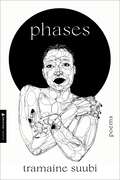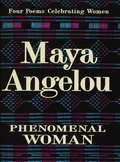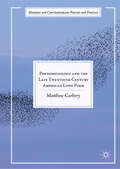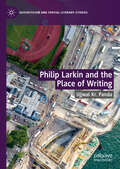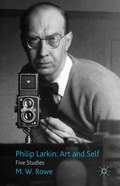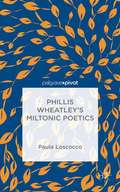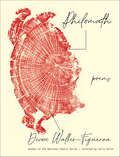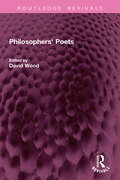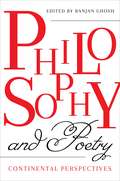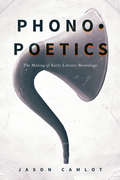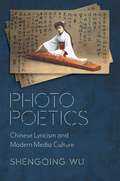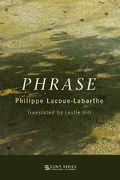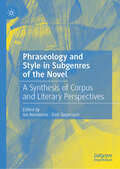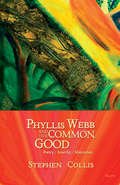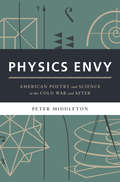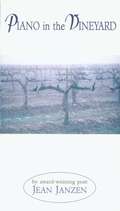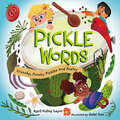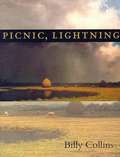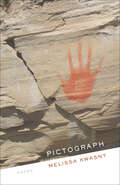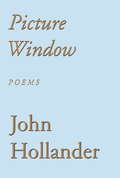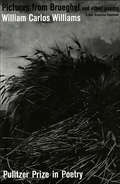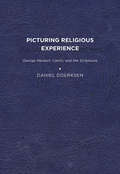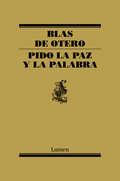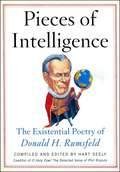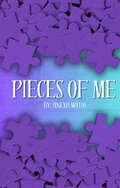- Table View
- List View
Phases: Poems
by Tramaine SuubiIn this electrifying debut poetry collection—written with the ferocity of Rita Dove’s groundbreaking Thomas and Beulah—a critically acclaimed award-winning talent explores a wide range of emotions, from anxiety to ecstasy reflecting the moon's phases, from Waning Gibbous to Full.Both intimate and intricately structured Tramaine Suubi’s remarkable work is inspired by the moon—its phases’ effects on water, the Earth, and our bodies. Phases relishes in the beauty of change, even that caused by heartbreak. Suubi’s refreshing, vulnerable verse begs to be underlined, memorized, and shared; each of her poems operate as love letters to the cyclical healing that occurs in nature, in our bodies, and in the bodies that have come before us.
Phenomenal Woman: Four Poems Celebrating Women
by Maya AngelouA collection of beloved poems about women from the iconic Maya AngelouThese four poems, &“Phenomenal Woman,&” &“Still I Rise,&” &“Weekend Glory,&” and &“Our Grandmothers,&” are among the most remembered and acclaimed of Maya Angelou's poems. They celebrate women with a majesty that has inspired and touched the hearts of millions.&“Phenomenal Woman&” is a phenomenal poem that speaks to us of where we are as women at the dawn of a new century. In a clear voice, Maya Angelou vividly reminds us of our towering strength and beauty.
Phenomenology and the Late Twentieth-Century American Long Poem (Modern and Contemporary Poetry and Poetics)
by Matthew CarberyPhenomenology and the Late Twentieth-Century American Long Poem reads major figures including Charles Olson, Lyn Hejinian, Nathaniel Mackey, Susan Howe and Rachel Blau DuPlessis within a new approach to the long poem tradition. Through a series of contextualised close readings, it explores the ways in which American poets developed their poetic forms by engaging with a variety of European phenomenologists, including Hannah Arendt, Maurice Merleau-Ponty, Martin Heidegger, Emmanuel Levinas and Jacques Derrida. Consolidating recent materials on the role of Continental Philosophy in American poetics, this book explores the theoretical and historical contexts in which avant-garde poets have developed radically new methods of making poems long. Matthew Carbery offers a timely commentary on a number of major works of American poetry whilst providing ground-breaking research into the wider philosophical context of late twentieth-century poetic experimentation.
Philip Larkin and the Place of Writing (Geocriticism and Spatial Literary Studies)
by Ujjwal Kr. PandaThis book extensively investigates the integral nature of spatiality and spatial imagination in the works of Philip Larkin. It addresses Larkin's idea of space and place, both private and public, and reflects upon his early fictional works as well as poems. To do so, the book also emphasizes the essential spatiality of modern British literature with suitable examples from other great poets of the early 20th century modernist movement, including T.S. Eliot, W.B. Yeats, W.H. Auden, and Dylan Thomas. By including detailed analysis of many unpublished poems and his early fictions, the book aspires to be a comprehensive study of Larkin's oeuvre and thus examines how Larkin's sense of place changed as he developed as a writer, starting with Brunette Coleman novels and going on to High Windows. Featuring suitable references from his biographies and letters, the book will examine Larkin's works in relation to a number of relevant ideas from the interdisciplinary spheres of literature, geography and Spatial Humanities.
Philip Larkin: Art and Self
by M. W. RoweExploring the complex relationship between aesthetic experience and personal identity in Larkin's work, this book gives close and original readings of three major poems ('Here', 'Livings' and 'Aubade'), and two neglected but important themes (Larkin and the supernatural, Larkin and Flaubert).
Phillis Wheatley’s Miltonic Poetics
by Paula LoscoccoPhillis Wheatley, the African-born slave poet, is considered by many to be a pioneer of Anglo-American poetics. This study argues how in her 1773 POEMS, Wheatley uses John Milton's poetry to develop an idealistic vision of an emerging Anglo-American republic comprised of Britons, Africans, Native Americans, and women.
Philomath: Poems
by Devon Walker-FigueroaSelected by Sally Keith as a winner of the 2020 National Poetry Series, this debut collection is a ruminative catalogue of overgrowth and the places that haunt us. With Devon Walker-Figueroa as our Virgil, we begin in the collection’s eponymous town of Philomath, Oregon. We drift through the general store, into the Nazarene Church, past people plucking at the brambles of a place that won’t let them go. We move beyond the town into fields and farmland—and further still, along highways, into a cursed Californian town, a museum in Florence. We wander with a kind of animal logic, like a beast with “a mindto get loose / from a valley fallowing / towards foul,” through the tense, overlapping space between movement and stillness. An explorer at the edge of the sublime, Walker-Figueroa writes in quiet awe of nature, of memory, and of a beauty that is “merelyexistence carrying on and carrying on.” In her wanderings, she guides readers toward a kind of witness that doesn’t flinch from the bleak or bizarre: A vineyard engulfed in flames is reclaimed by the fields. A sow smothers its young, then bears more. A neighbor chews locusts in his yard. For in Philomath, it is the poet’s (sometimes reluctant) obligation “to keep an eye / on what is left” of the people and places that have impacted us. And there is always something left, whether it is the smell of burnt grapes, a twelfth-century bronze, or even a lock of hair.
Philosophers' Poets (Routledge Revivals)
by David WoodFirst published in 1990, Philosophers’ Poets is a collection of case studies of philosophers’ readings of poets and other distinctive writers. There are those, for example, who find in literary examples ways of exploring the concrete significance of philosophical assertions or distinctions. Others find in poetic discourse linguistic resources simply not available to philosophy, yet of vital importance to it. This is particularly true of philosophers of the limit, such as Heidegger, Derrida, Levinas and Adorno, for whom the very possibility of philosophy was in question. Despite the diversity of subjects covered, the collection maintains an integrity and identity. Above all, it shows how contemporary Continental philosophy raises the issue of philosophy and literature anew in a way that is appealing and challenging.
Philosophy and Poetry: Continental Perspectives
by Ranjan GhoshEver since Plato’s Socrates exiled the poets from the ideal city in The Republic, Western thought has insisted on a strict demarcation between philosophy and poetry. Yet might their long-standing quarrel hide deeper affinities? This book explores the distinctive ways in which twentieth-century and contemporary continental thinkers have engaged with poetry and its contribution to philosophical meaning making, challenging us to rethink how philosophy has been changed through its encounters with poetry.In wide-ranging reflections on thinkers such as Heidegger, Gadamer, Arendt, Lacan, Merleau-Ponty, Deleuze, Irigaray, Badiou, Kristeva, and Agamben, among others, distinguished contributors consider how different philosophers encountered the force and intensity of poetry and the negotiations that took place as they sought resolutions of the quarrel. Instead of a clash between competing worldviews, they figured the relationship between philosophy and poetry as one of productive mutuality, leading toward new modes of thinking and understanding. Spanning a range of issues with nuance and rigor, this compelling and comprehensive book opens new possibilities for philosophical poetry and the poetics of philosophy.
Phonopoetics: The Making of Early Literary Recordings
by Jason CamlotPhonopoetics tells the neglected story of early "talking records" and their significance for literature, from the 1877 invention of the phonograph to some of the first recorded performances of modernist works. The book challenges assumptions of much contemporary criticism by taking the recorded, oral performance as its primary object of analysis and by exploring the historically specific convergences between audio recording technologies, media formats, generic forms, and the institutions and practices surrounding the literary. Opening with an argument that the earliest spoken recordings were a mediated extension of Victorian reading and elocutionary culture, Jason Camlot explains the literary significance of these pre-tape era voice artifacts by analyzing early promotional fantasies about the phonograph as a new kind of speaker and detailing initiatives to deploy it as a pedagogical tool to heighten literary experience. Through historically-grounded interpretations of Dickens impersonators to recitations of Tennyson to T.S. Eliot's experimental readings of "The Waste Land" and of a great variety of voices and media in between, this first critical history of the earliest literary sound recordings offers an unusual perspective on the transition from the Victorian to modern periods and sheds new light on our own digitally mediated relationship to the past.
Photo Poetics: Chinese Lyricism and Modern Media Culture (Global Chinese Culture)
by Shengqing WuChinese poetry has a long history of interaction with the visual arts. Classical aesthetic thought held that painting, calligraphy, and poetry were cross-fertilizing and mutually enriching. What happened when the Chinese poetic tradition encountered photography, a transformative technology and presumably realistic medium that reshaped seeing and representing the world?Shengqing Wu explores how the new medium of photography was transformed by Chinese aesthetic culture. She details the complex negotiations between poetry and photography in the late Qing and early Republican eras, examining the ways traditional textual forms collaborated with the new visual culture. Drawing on extensive archival research into illustrated magazines, poetry collections, and vintage photographs, Photo Poetics analyzes a wide range of practices and genres, including self-representation in portrait photography; gifts of inscribed photographs; mass-media circulation of images of beautiful women; and photography of ghosts, immortals, and imagined landscapes. Wu argues that the Chinese lyrical tradition provided rich resources for artistic creativity, self-expression, and embodied experience in the face of an increasingly technological and image-oriented society. An interdisciplinary study spanning literary studies, visual culture, and media history, Photo Poetics is an original account of media culture in early twentieth-century China and the formation of Chinese literary and visual modernities.
Phrase (SUNY series, Literature . . . in Theory)
by Philippe Lacoue-LabarthePhilippe Lacoue-Labarthe (1940–2007) is widely acknowledged in his native France and in the English-speaking world as one of the most important philosophers of his generation and an exceptionally rigorous reader of Heidegger, Hölderlin, Benjamin, Blanchot, and Celan. An astute thinker of the political and a far-reaching and decisive analyst of the place of theater and music in Western metaphysics, Lacoue-Labarthe also had another, clandestine passion for something called "poetry" or "literature," though he would remain deeply suspicious of these words. Phrase is his most original work, a sequence of texts both autobiographical and philosophical, written in lucid prose and in free verse over a period of more than twenty-five years.Published here in its entirety for the first time in English, Phrase is a profoundly moving meditation on the relationship between love and mortality, language and embodiment, writing and inspiration, memory and hope, loss and recompense, and music and silence. At its heart is a probing awareness of the mysterious gift of language itself, and of the perpetually elusive yet obsessive "phrase" that informs all human existence and provides the book with its lapidary title and distinctive signature. This translation also includes a postface by Jean-Christophe Bailly, one of Lacoue-Labarthe's most long-standing friends and interlocutors, and incorporates a number of translator's notes that will facilitate access to Lacoue-Labarthe's sometimes allusive writing. There is no better introduction to Lacoue-Labarthe's thought than Phrase, and no more compelling proof of the enduring significance of his thinking than this uniquely powerful text.
Phraseology and Style in Subgenres of the Novel: A Synthesis of Corpus and Literary Perspectives
by Iva Novakova Dirk SiepmannThis edited book represents the first cohesive attempt to describe the literary genres of late-twentieth-century fiction in terms of lexico-grammatical patterns. Drawing on the PhraseoRom international project on the phraseology of contemporary novels, the contributed chapters combine literary studies with corpus linguistics to analyse fantasy, romance, crime, historical and science fiction in French and English. The authors offer new insights into long-standing debates on genre distinction and the hybridization of genres by deploying a new, interdisciplinary methodology. Sitting at the intersection of literature and linguistics, with a firm grounding in the digital humanities, this book will be of particular relevance to literary scholars, corpus stylists, contrastivists and lexicologists, as well as general readers with an interest in twentieth-century genre fiction.
Phyllis Webb and the Common Good
by Stephen CollisPhyllis Webb is a poet around whom archetypes tend to cluster: the reclusive artist; the distraught, borderline suicidal Sapphic woman poet. While on the surface she seems someone supremely disinterested in the public sphere, argues Stephen Collis in this brilliant and revealing new celebration of her work, Webb is no domestic, as a creator or a critic. Her work sweeps into the wilds of politics, philosophy, economics and her slim books speak volumes. If there is a sense of abandoned projects hovering as ghosts on the margins of her books it is a purposeful abandonment, an anarchist's abdication of positions of power and authority. Webb's work points steadily towards the idea that the poem is not a commodity to be hoarded, but a response-ability to be shared, an aspect of the commons and our "common good." The gradual dissolution of the lyric I traceable over the course of her writing career mirrors both the development of avant-garde poetics across the century and the anarchist inflected notion of the poem as a common property --an effect of language (the commons) and not the self (the private). In this sense Collis reads Webb's poetry as it conjoins (and simultaneously diverges from) various twentieth-century literary movements and moments--it is this tension in her work which makes Webb a modernist whose writing nevertheless provides an opening into postmodernism. Her work constructs bridges across numerous conceptual divides: the (porous) boundaries between poetry and painting, poetry and politics, modernism and postmodernism, the lyric and the long poem, the ontologies of the self and the other. The changes across decades of Webb's writing, Collis argues, mirror changes in the approaches of the twentieth-century avant-garde to questions of responsibility and abstraction, locating her work in the Image-Nation of radical, philosophically engaged poetries that have flourished throughout twentieth-century North America.
Physics Envy
by Peter MiddletonAt the close of the Second World War, modernist poets found themselves in an increasingly scientific world, where natural and social sciences claimed exclusive rights to knowledge of both matter and mind. Following the overthrow of the Newtonian worldview and the recent, shocking displays of the power of the atom, physics led the way, with other disciplines often turning to the methods and discoveries of physics for inspiration. In Physics Envy, Peter Middleton examines the influence of science, particularly physics, on American poetry since World War II. He focuses on such diverse poets as Charles Olson, Muriel Rukeyser, Amiri Baraka, and Rae Armantrout, among others, revealing how the methods and language of contemporary natural and social sciences--and even the discourse of the leading popular science magazine Scientific American--shaped their work. The relationship, at times, extended in the other direction as well: leading physicists such as Robert Oppenheimer, Werner Heisenberg, and Erwin Schrödinger were interested in whether poetry might help them explain the strangeness of the new, quantum world. Physics Envy is a history of science and poetry that shows how ultimately each serves to illuminate the other in its quest for the true nature of things.
Piano in the Vineyard
by Jean JanzenOnce again, Jean Janzen writes mighty poems, finding those heart-stopping human moments for which there is no adequate language. Janzen, a National Endowment for the Arts winner, begins this newest collection of poetry with "Wailing in the Shower" and these arresting stanzas: "After the elation of giving birth, our new daughter fed and sleeping, I stand under the warm water and begin on the high notes-- Madame Butterfly's ecstasy, One fine day in May, the harmony sliding over my body. After the loss of his bride, our friend turns on the guestroom shower and begins his long wailing. It echoes through the house, flows down the stairway, his baritone cries rising and falling. Over and over, the full octaves." And she goes on to mark the full-throated human experience, placing her 42 poems into these sections: "Broken Places," "The Garden," "Carving the Hollow," and, finally, "Piano in the Vineyard." In every poem Janzen is utterly conscious of the unspeakable wonder and terror of being alive. Jean Janzen is a winner of The Creative Writing Fellowship from the National Endowment for the Arts.
Pickle Words: Crunchy, Punchy Pickles and Poetry
by April Pulley SayreThis sweet and spicy celebration of all things pickled is the perfect poetry picture book for foodies of all ages!Open this book to savor a riotous rainbow of pickles. Not just green cucumbers, but yellow peppers, pink cabbages, and purple plums! Pickles come in all shapes and sizes—and so do the words that describe them. Punchy poetry and zesty art tell the story of a diverse community drawn together by their love of pickles. From kosher dills to sweet chutney to tangy kimchi, Pickle Words describes them all in this global tour of pickled foods. Back matter includes the science of pickling, an easy recipe for refrigerator pickles, and a visual glossary of pickles from around the world.
Picnic Lightning
by Billy Collins"Bonsai All it takes is one to throw a room completely out of whack. Over by the window it looks hundreds of yards away, a lone stark gesture of wood on the distant cliff of a table. Up close, it draws you in, cuts everything down to its size. Look at it from the doorway, and the world dilates and bloats. The button lying next to it is now a pearl wheel, the book of matches is a raft, and the coffee cup a cistern to catch the same rain that moistens its small plot of dark, mossy earth. For it even carries its own weather, leaning away from a fierce wind that somehow blows through the calm tropics of this room. The way it bends inland at the elbow makes me want to inch my way to the very top of its spiky greenery, hold onto for dear life and watch the sea storm rage, hoping for a tiny whale to appear. I want to see her plunging forward through the troughs, tunneling under the foam and spindrift on her annual, thousand-mile journey. Splitting Wood Frost covered this decades ago, and frost will cover it again tonight, the leafy disarray of this woodland now thinned down to half its trees, but this morning I stand here sweating in a thin shirt as I split a stack of ash logs into firewood with two wedges, an ax, and a blue-headed maul. The pleasures here are well known: the feet planted wide, the silent unstoppable flow of the downswing, the coordination that is called hand-eye, because the hand achieves whatever the concupiscent eye desires when it longs for a certain spot, which, in this case, is the slightest fissure visible at one end of the log where the thin, insinuating edge of the blade can gain entry, where the shape of its will can be done. ..."
Pictograph: Poems
by Melissa KwasnyThe prize-winning poet evokes the spirit of nature in this collection inspired by the sacred sites around her rural Montana home.“If you would learn the earth as it really is,” N. Scott Momaday writes, “learn it through its sacred places.” With this quote as her guiding light, Melissa Kwasny traveled to ancient pictograph and petroglyph sites across Montana.In Pictograph, she captures the natural world she encounters around the sacred art, filling it with new, personal meaning: brief glimpses of starlight through the trees become a reminder of the impermanence of life, the controlled burn of a forest a sign of the changes associated with aging.Unlike traditional nature poets, however, Kwasny acknowledges the active spirit of each place, agreeing that “we make a sign and we receive.” Not only do we give meaning to nature, Kwasny suggests, but nature gives meaning to us. As the collection closes, the poems begin to coalesce into a singular pictograph, creating “a fading language that might be a bridge to our existence here.”
Picture Window
by John HollanderIn this deeply philosophical and highly inventive new collection, John Hollander, the distinguished author of numerous books of poetry, offers profound yet playful meditations on the reflective mind and on the words with which we come to know the world. In forms as varied as sonnets, songs, and ancient odes, he muses over the ways we use (and misuse) language as "we grasp the world by ear, by heart, by head / And keep it in a soft continuingness."Here, too, are striking verses about the passage of time as recorded by the movement of light and shadow across a surface, whether it be the face of a clock or the enclosed walls of a Hopper painting. Throughout, Hollander delights us with mirrors, palindromes, and strange and surprising reversals that keep the mind ever alert with the challenge "to make words be themselves, taking time out / From all the daily work of meaning, to / Make picture puzzles of what they're about." Donna Seaman has written of John Hollander, "His wise and robustly complex poems span the mind like stone aqueducts or canyon-crossing railroad bridges--awesome works of knowledge and craft, art and devotion." In this exciting new volume, Hollander shows once again the reach of his poetic imagination.From the Hardcover edition.
Pictures from Brueghel: Pulitzer Prize, Poetry
by William Carlos WilliamsThis collection makes available work of one of our greatest American poets in the last decade of his life. The first section, Pictures from Brueghel, contains previously uncollected short poems, while the second and third parts are the complete texts of The Desert Music (1954) and Journey to Love (1955), originally published by Random House. This collection makes available work of one of our greatest American poets in the last decade of his life. The first section, Pictures from Brueghel, contains previously uncollected short poems, while the second and third parts are the complete texts of The Desert Music (1954) and Journey to Love (1955), originally published by Random House. In these books, Dr. Williams perfected his "variable foot" metric and achieved full mastery of the "American idiom" which was his lifelong first concern. Among the poems of this period is the long "Asphodel, That Greeny Flower" which W. H. Auden has called "one of the most beautiful love poems in the language." Pictures from Brueghel was awarded the Pulitzer Prize for Poetry only two months after William Carlos Williams' death on March 4, 1963.
Picturing Religious Experience: George Herbert, Calvin, and the Scriptures
by Daniel DoerksenLittle has been said about the relationship of Herbert’s writings to those of John Calvin, yet the latter were abundant and influential in Herbert’s Church of England. Accordingly Picturing Religious Experience studies Herbert’s poetry in relation to those writings, particularly regarding “spiritual conflicts,” which the poet himself said would be found depicted in his book of poems. Much more than is generally realized, Calvin wrote about the experience of living the Christian life—which is also Herbert’s subject in many of his poems. Altogether, this study maintains that Herbert owes to his religious orientation not just themes or details, but an impulse to observe and depict the inner life, and scriptural patterns which significantly contribute to the substance and literary excellence of The Temple. Published by University of Delaware Press. Distributed worldwide by Rutgers University Press.
Pido la paz y la palabra (Libros Hiperion Ser.)
by Blas de OteroPara iniciar la colección Poesía de la editorial, Lumen presenta la primera edición íntegra de Pido la paz y la palabra, escrita en 1955 -y enmarcada dentro de una época del autor de poesía de denuncia social-, que es seguramente el libro más denso y tenso de una obra rigurosa y personalísima. Blas de Otero nació en Bilbao en 1916. La publicación de su primer libro, Ángel fieramente humano, produce una auténtica conmoción en la poesía española de posguerra. A partir de entonces (1950), su nombre representa una de las cimas de la poesía española del siglo XX, a la vez que dota de actualidad a la tradición que la poesía cívica y moral tiene en la literatura de todos los tiempos y países. Pido la paz y la palabra es ya un título clásico en la poesía española de posguerra, un libro estremecedor, único y de apabullante actualidad.
Pieces of Intelligence The Existential Poetry of Donald H. Rumsfeld
by Hart SeelyFor all its known and unknown unknowns, Pieces of Intelligence is less about national affairs than about the poet himself. From the era when gas stations held "little things" of glass to the leak-filled corridors of present-day Washington, Rumsfeld stands out as a man whose quest for real answers long ago required the kinds of questions no reporter dared to ask. "What in the world am I doing here?" he says, in "A Confession." His answer is no less a riddle. "It's a big surprise," and nothing more. Sometimes comic, sometimes dark, D. H. Rumsfeld's poetry is irreverent but always relevant, occasionally structurally challenged and always structurally challenging. Pieces of Intelligence is the U.S. defense secretary's long-awaited first collection, combining precision-guided insights and a revolution in metaphorical affairs, to take the reader on a dazzling journey of the spoken verse.
Pieces of Me
by Anexis MatosUnleash your inner teen, fangirl, and your best and worse parts in this debut poetry collection. The cringe of being a teenage girl. Blindness in all its glory and challenge. The fantastic parts of fandom. The power of stories. From reflections to a tragic love story of Death and their priestess, a poem is waiting to become your favorite.
